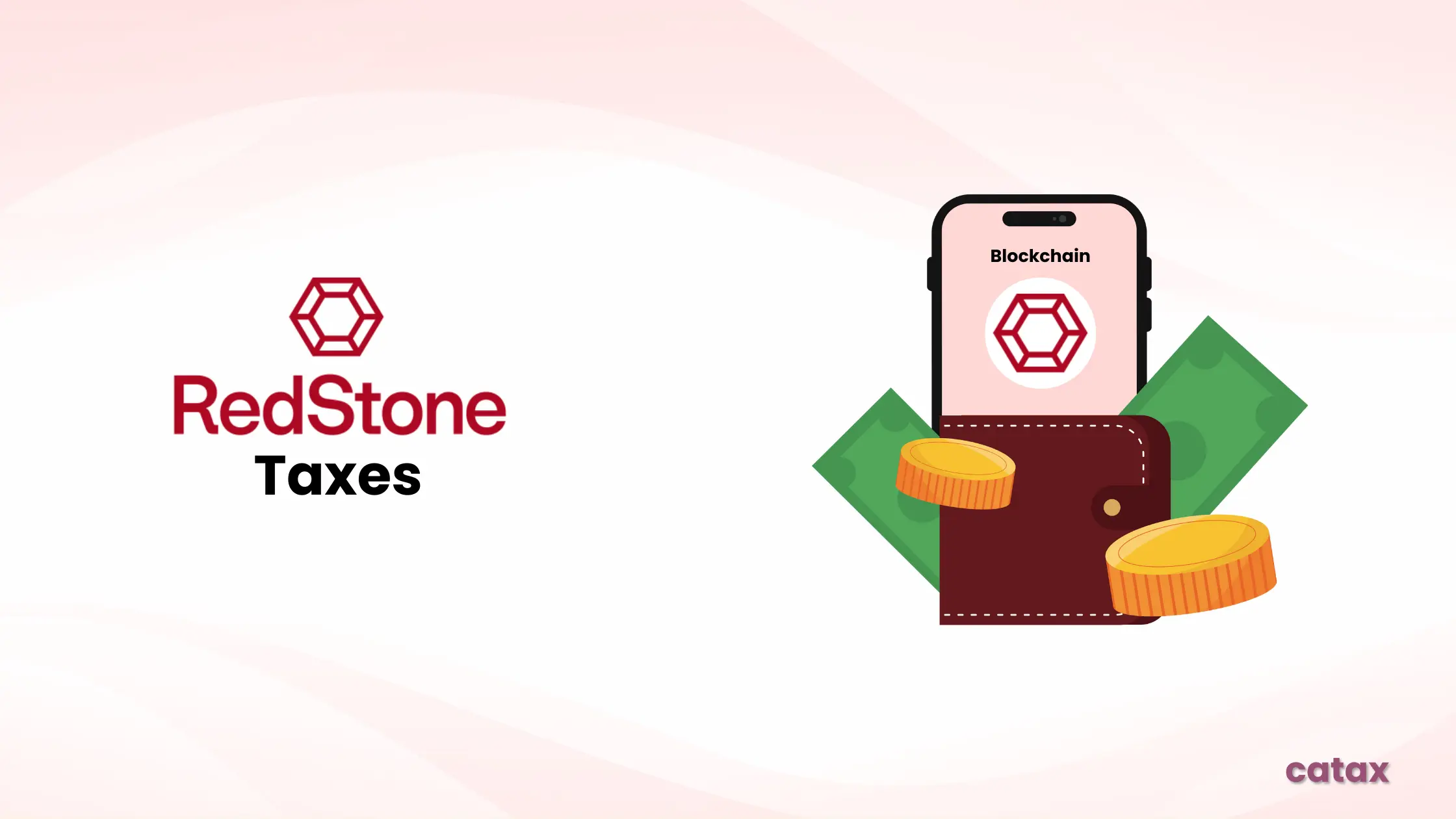Cryptocurrency tax rules differ across countries, and Redstone (RED) taxes transactions may be taxed based on how local authorities classify them. Whether you buy, sell, trade, or stake RED, understanding your country’s tax treatment is key to staying compliant and avoiding penalties.
This guide breaks down Redstone tax rules to help you manage your taxes with clarity and confidence.

- How to Connect Your Redstone Wallet to Catax?
- Are Redstone (RED) Transactions Taxable?
- Can You Deduct Trading Fees and Other Costs?
- Other jurisdictions only permit:
- How Is Redstone (RED) Taxed Based on Holding Period?
- How Is Staking Income Taxed for Redstone (RED)?
- Can You Claim Redstone (RED) Losses for Tax Benefits?
- How to Stay Compliant with Redstone (RED) Tax Rules?
How to Connect Your Redstone Wallet to Catax?
To track your Redstone (RED) transactions and calculate taxes seamlessly, follow these simple steps to connect your wallet to Catax:
- Open your Redstone wallet or access a supported block explorer.
- Copy your public wallet address from your Redstone wallet.
On Catax:
- Log in to your Catax account and select your country.
- Select Chain, then search for Redstone Wallet.
- Paste your public address and click Connect.
Once connected, Catax will automatically sync your RED transactions, helping you stay organized and compliant with your crypto tax reporting.
Calculate My Taxes ➤Are Redstone (RED) Transactions Taxable?
Yes, in most countries, Redstone (RED) transactions are taxable. Depending on how you use RED, tax authorities may classify it as a capital asset, property, or income.
When Do You Have to Pay Taxes on Redstone (RED)?
You may need to pay taxes when you:
- Sell RED for a profit – If you sell Redstone for more than you paid, the profit is typically subject to capital gains tax.
- Trade RED for another cryptocurrency – Swapping RED for Bitcoin, Ethereum, or any other crypto may trigger a taxable event.
- Use RED for purchases – Buying goods or services with RED could lead to a taxable gain if its value has increased since you acquired it.
- Earn RED from staking or workflows – Any RED earned through staking or automated processes is usually treated as income and taxed upon receipt.
- Receive RED as payment – If you’re paid in RED for products or services, the value of the RED at the time of receipt is typically taxed as income.
Tax treatment varies by country, so always consult your local crypto tax regulations.
Can You Deduct Trading Fees and Other Costs?
Whether you can deduct costs associated with managing or trading RED depends on your country’s tax laws.
Some countries allow deductions for:
- Trading fees when buying or selling RED
- Network or transaction fees for transferring RED between wallets
Other jurisdictions only permit:
- Deducting the original purchase price of RED (your cost basis), without allowing extra deductions for fees or tools.
Always review your local tax rules to understand which deductions apply.
How Is Redstone (RED) Taxed Based on Holding Period?
Your tax rate on RED gains may differ depending on how long you held the tokens:
- Short-term holdings (under one year) – Often taxed at regular income tax rates.
- Long-term holdings (over one year) – Some countries offer reduced tax rates for long-term crypto investments.
- Flat-rate systems – In certain countries, a fixed tax rate applies regardless of holding duration.
Knowing how your region handles holding periods can help you create an efficient tax strategy and potentially lower your tax liability.
You can also check out our Country-Specific Guide for Crypto in Your country. This guide provides insights on regulations, tax implications, and compliance measures breifly explained for each country.
How Is Staking Income Taxed for Redstone (RED)?
Staking or earning through Redstone’s automation workflows can generate passive income, but how it’s taxed varies by country. Some tax authorities impose taxes as soon as you receive RED rewards, while others only apply tax when you sell or convert them.
How Countries Tax Staking or Workflow Rewards?
- Taxed as income – Many governments treat Redstone rewards like salary. Taxes are due immediately when rewards are received, based on their market value at that time.
- Taxed as capital gains – In some countries, taxes apply only when you sell or exchange your RED tokens. In this case, only the profit is taxed.
If you’re earning through Redstone’s staking or workflows, knowing when taxes apply helps you plan ahead and avoid surprises.
Always check your local tax regulations before engaging in Redstone staking or automation to ensure compliance.
Can You Claim Redstone (RED) Losses for Tax Benefits?
Not every Redstone trade is profitable. If you sell RED at a loss, you might be able to reduce your tax liability, depending on your country’s rules. Here’s how different countries handle crypto losses:
- Loss offsets – Some jurisdictions let you subtract Redstone losses from your capital gains, so you’re taxed only on net profit.
- Loss carryforward – If you don’t have gains this year, you might be able to carry the losses forward to offset future gains.
- Limited deductions – In certain regions, crypto losses aren’t deductible, meaning you can’t use RED losses to reduce your taxes.
Maintaining clear, accurate records of each transaction is crucial to properly report and potentially benefit from losses.
How to Stay Compliant with Redstone (RED) Tax Rules?
With crypto tax policies evolving, staying compliant is essential. To avoid penalties and simplify reporting:
- Understand how your country taxes Redstone activity – Know whether RED gains are taxed as capital gains, income, or business revenue.
- Know what expenses are deductible – Some countries let you deduct transaction fees, staking rewards, or storage/security costs.
- Use a crypto tax tool like Catax – Catax simplifies your tax reporting by automatically syncing your wallet and calculating taxes on your RED transactions.
- Consult a tax expert – When in doubt, talk to a professional to ensure you’re meeting all tax obligations for your crypto activity.
Stay informed, organized, and proactive to handle Redstone taxes with confidence and compliance.
Book a Free Consultation Now →

